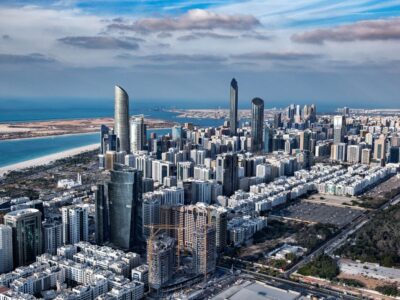Employee wellness is directly correlated with greater productivity. While more companies are catching on, there’s more to be done to integrate employee wellbeing into corporate culture.
Greater flexibility has been a key driver for greater employee happiness, but flexibility isn’t only about the physical location where work happens – it’s about making arrangements that most suit your team members’ specific needs.
Arabian Business spoke with Natalja Kissina, human resources vice president and sustainability leader for Schneider Electric in the Gulf, about why it’s important to prioritise employee wellbeing and what companies can do to step up their game ahead of the Wellbeing at Work Middle East Summit in late February.
As a leader based in the region, what are the main challenges you are facing when it comes to employee wellbeing?
Considering the ongoing pandemic and the new hybrid work environment across the globe, one of the key challenges we face is the human connection aspect. Working from home has meant that most employees only see and interact with their coworkers and managers through a screen, which can be challenging as human beings are social creatures who thrive on face-to-face interaction.
With this in mind, we ask our employees to come to the office three out of the five days so they can benefit from seeing their colleagues and be together in a safe working environment where they can collaborate, discuss and connect in person. We also organised a successful mental health run late last year to highlight the importance of exercise and being outdoors for our employees’ mental health.
To this end, another key challenge we face is promoting a more active culture in the workplace. Workloads and more online meetings mean that many employees across the region sit for long periods of time, which is not ideal. We try to encourage movement through our various runs and regular wellbeing sessions, covering mental health, yoga, meditation, and other key stress relief techniques.
What strategies have you seen developing in the region over the past six to 12 months during the pandemic to address health and wellbeing in the workplace?
In the last six to 12 months, I have seen a bigger push from many global and local companies in the region with regards to giving employees more flexibility with their work schedules. This is wonderful as it allows employees a better work-life balance and ensures that caregivers and parents can provide and care for their families and dependents and manage their work at the same time.

After all, flexibility is not solely about location; it is also about a series of arrangements to boost productivity while fostering inclusion and diversity in the workplace and realising that each employee has unique needs and different personal responsibilities.
I have also seen an uptake in the number of employee wellbeing and health-related events and conferences taking place, which means these topics are becoming a key priority in the region, which is great to see.
I also see a greater push for hybrid working plans by companies – both international and local – to ensure safety protocols are met and also to ensure employees can enjoy a mix of working environments where they feel the most comfortable, happy and most productive.
Why is employee wellbeing so important to you personally?
For me personally, wellbeing is extremely important because employees who are happy and healthy create a positive and nurturing environment for the company to grow and succeed. It’s quite simple: When our employees are doing well, so are we because they are the foundation of everything we do.
Moreover, in my experience, I have seen that investing considerably in employee wellbeing can lead to increased resilience, stronger employee engagement, reduced sickness-related absence and higher performance and productivity. But for this to be successful, employee wellbeing priorities must be integrated throughout an organisation. It should be embedded in its culture, leadership and people management strategy, which is exactly what we strive to achieve at Schneider Electric.

What are you most looking forward to about our event in February?
I am looking forward to connecting with like-minded individuals from the industry to sit down together and start a conversation on how we can support and increase the wellbeing of our employees given the new hybrid working environment we find ourselves in. I am also looking forward to learning about the best practices followed by other key companies in the region and how we can implement similar practices at Schneider Electric in the Gulf and create a win-win situation for our people.
Tell us, what is your vision for the workplace of the future, in terms of employee engagement, health and wellbeing?
Well, I believe the workplace of the future is hybrid. In fact, in 2021, Gartner Inc announced from its research findings that there is no going back to the work model that prevailed before the pandemic. Companies that give employees the freedom to work from home are more attractive to potential employees and are not restricted to the local job market. From a sustainability and cost perspective, there are also gains as firms are less burdened by office space and business travel overheads. This set-up also translates into an organisation that is eco-friendlier and more sustainable and has a lower carbon footprint.
Covid-19 has undoubtedly influenced all areas of employees‘ personal and professional lives. What are the key learnings from this period and what are your tips for supporting each other through uncertainty?
I think the pandemic has definitely affected us all in all aspects of our lives whether that be in terms of health, travel, work and life in general. One key takeaway is definitely the potential for feelings of isolation and detachment when working predominately at home and on your own. Work gives us a sense of shared purpose and a connection with other people.
No matter what industry you’re in, a workplace is a community. However, when team members are on their own at home, they start to feel more isolated. They can lose sight of the company vision and disengage from their workplace.
Keeping this in mind, we made it a point at Schneider Electric to reach out to our employees during the pandemic through our internal communications channels and via regular monthly Gulf staff and wellbeing meetings to create a sense of togetherness and unity online.
Another key learning from this period is the importance of supporting our teams and management during these times by reaching out through regular calls and checking in on those we are working it. Globally, anxiety levels are at an all-time high, so we also learned how crucial it is to foster a culture where exercise, time with family and time in nature are balanced along with work commitments.





